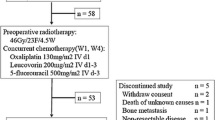Abstract
Background: Postoperative adjuvant chemoradiation treatment after curative resection for rectal cancer was needed to reduce recurrence and improve a survival rate. Intravenous 5-fluorouracil (5-FU) and leucovorin has been a mainstay of chemotherapy, but oral 5-FU derivatives have been shown a comparable antitumor activity. Intravenous 5-FU and oral doxifluridine were compared with respect to therapeutic efficacy, drug toxicity, and quality of life.
Methods: A total of 166 patients were randomized to receive intravenous 5-FU (450 mg/m2/day) or oral doxifluridine (900 mg/m2/day) in combination with leucovorin (20 mg/m2/day) for depth of invasion, nodal status, metastasis (TNM) stage II and III patients between October 1997 and February 1999. Consecutive daily intravenous infusion for 5 days per every month for a total of 12 cycles (IV arm, n = 74) and oral doxifluridine daily for 3 weeks and 1 week rest for a total of 12 cycles (oral arm, n = 92). Drug toxicity and quality of life were observed. Quality of life was scored according to 22 daily activity items (good, ≥ 71; fair, < 70; poor, < 52).
Results: There was no difference of sex between two groups (IV arm: male/female = 45/29, oral arm: male/female = 59/33). The mean age was 52.3 vs. 59.5, respectively. There was also no difference of TNM stage distribution and type of operation between groups (P = .05). Mean numbers of chemotherapy cycles were 6.5 ± 3.7 (IV arm) vs. 7.2 ± 4.3 (oral arm), respectively. The rate of recurrence was 9/74 (12.1%) in the IV arm and 6/92 (6.5%) in the oral arm, respectively (P = .937). Local recurrence was 2/74 (stage III; 2.7%) in the IV arm and 1/92 (stage II;1.1%) in the oral arm, respectively. Systemic recurrence was 7/74 (stage III; 9.4%) in the IV arm and 5/92 (stage III; 5.4%) in the oral arm, respectively. The most common site of systemic recurrence was the liver. Toxicity profile was as follows: leukopenia (30/74 vs. 17/92) and alopecia (21/74 vs. 13/92) were statistically more common in the IV arm. Diarrhea was more common in the oral arm. Poor quality of life score between two groups was observed at 1 month (23.9% vs. 13%) and 2 months (15.8% vs. 3.7%) after chemotherapy. Good quality of life score was observed at 1 month (19.5% vs. 49%) and 2 months (47% vs. 72%), respectively (P < .05).
Conclusions: Oral doxifluridine with leucovorin shows a comparable therapeutic efficacy to intravenous 5-FU regimen with high quality of life as postoperative adjuvant therapy. The oral regimen also can be safely given with appropriate toxicity and tolerability.
Similar content being viewed by others
References
Allegra CJ, Grem JL. Antimetabolites in cancer. In: De Vita VT, Hellman S, Rosenberg SA, eds. Principles and Practice of Oncology. 5th ed. Philadelphia: Lippincott-Raven, 1997:432–452.
Macdonald JS. Oral fluoropyrimidines: a closer look at their toxicities. Am J Clin Oncol 1999;22:475–486.
Bajetta E, Colleoni M, Rosso R, et al. Prospective randomized trial comparing fluorouracil versus doxifluridine for the treatment of advanced colorectal cancer. Eur J Cancer 1993;29A:1658–1663.
Kurihara M, Shimiz H, Tsuvoi Y, et al. Evaluation of quality of life score according to protocol of anticancer chemotherapy. CRC 1992;1(4):174–181.
Moertel CG. Chemotherapy for colorectal cancer. N Engl J Med 1994;330:1136–42.
Bleiberg H. Role of chemotherapy for advanced colorectal cancer: new opportunities. Semin Oncol 1996;23(Suppl 3):42–50.
Pazdur R, Lassere Y, Diaz-Canton, et al. Phase I trials of uraciltegafur (UFT) using 5 and 28 day administration schedules: demonstration of schedule-dependent toxicities. Anticancer Drugs 1996;7:728–733.
Ota K, Taguchi T, Kimura K. Report on nationwide pooled data and cohort investigation in UFT phase II study. Cancer Chemother Pharmacol 1988;22:333–338.
Kimura K, Saito T, Taguchi T. Experimental and clinical studies on the anticancer agent doxifluridine (59-dfur). J Int Med Res 1988;16(Suppl 2):1B–37B.
Bollag W, Hartmann HR. Tumor inhibitory effects of a new fluorouracil derivatives: 5-deoxy-5-fluorouridine. Eur J Cancer 1979;16:427–432.
The Meta-analysis Group in Cancer. Efficacy of intravenous continuous infusion of fluorouracil compared with bolus administration in advanced colorectal cancer. J Clin Oncol 1998;16:301–308.
Buroker T, O’Connell M, Wieand S, et al. Randomized comparison of two schedules of fluorouracil and leucovorin in the treatment of advanced colorectal cancer. J Clin Oncol 1994;12:14–20.
Bajetta E, Colleoni M, Bartolomeo MD, et al. Doxifluridine and leucovorin: an oral treatment combination in advanced colorectal cancer. J Clin Oncol 1995;13:2613–9.
Yoshimori K, Hasegawa K. Study on efficacy and safety of 59- deoxy-5 fluorouridine (59-dFUR) with intermittent administration. Prog Antimicrob Anticancer Chemother 1987;3:493–5.
Ota K. Multicentre cooperative phase II study of 5-deoxy-5-fluorouridine in the treatment of colorectal cancer. J Int Med Res 1988;16:19B–20B.
Au JL-S, Walker JS, Rustum Y. Pharmacokinetic studies of 5-fluorouracil and 59 deoxy-5-fluorouridine in rats. J Pharmacol Exp Ther 1983;1:174–80.
Meropol NJ. Oral fluoropyrimidines in the treatment of colorectal cancer. Eur J Cancer 1998;34:1509–1513.
Findlay M, Van Cutsem E, Kocha W, et al. A randomized phase II study of xeloda (capecitabine) in patients with advanced colorectal cancer [Abstract]. Proc Am Soc Clin Oncol 1997;16:227.
Author information
Authors and Affiliations
Corresponding author
Rights and permissions
About this article
Cite this article
Min, J.S., Kim, N.K., Park, J.K. et al. A Prospective Randomized Trial Comparing Intravenous 5- Fluorouracil and Oral Doxifluridine As Postoperative Adjuvant Treatment for Advanced Rectal Cancer. Ann Surg Oncol 7, 674–679 (2000). https://doi.org/10.1007/s10434-000-0674-9
Received:
Accepted:
Issue Date:
DOI: https://doi.org/10.1007/s10434-000-0674-9




